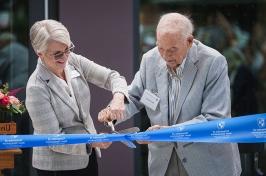
Last November, the presidents of China and the U.S. forged a commitment to reduce fossil fuel emissions. Other governments across the world are investing billions in renewable energy projects, and the U.S. government alone has a $34 billion portfolio in such investments. This is music to the ears of Ian Gagnon, who graduated last month with a degree in mechanical engineering and is planning a career in the renewable energy field.
Gagnon’s UNH journey took him into a high-speed cavitation tunnel, a high-tech research company, an alternative energy startup and to Africa, where he disinfected and fortified wells in two Ugandan communities as a member of the UNH chapter of Engineers Without Borders.
Not bad for the young man from the small town of Enfield in New Hampshire’s Upper Valley. And not surprising since engineering runs in Gagnon’s family — his grandfather and father are civil engineers, as is his sister, a 2011 UNH grad who works for a Manchester engineering consulting firm. “I’m kind of the black sheep,” Gagnon jokes about being on the mechanical side of the profession.
He’s in good company. In 2013, Gagnon began working as an undergraduate research assistant for associate professor Martin Wosnik in the UNH Center for Ocean Renewable Energy on a project to improve the performance of tidal turbines.

Ian Gagnon (right) and classmates presenting their senior project research at the UNH Undergraduate Research Conference in April 2015. (Photo: College of Engineering and Physical Sciences)
For his senior project, he and two classmates built a model to study offshore wind turbine arrays. “It’s getting to be pretty well understood how individual wind turbines work,” Gagnon says. “But less is known about what happens when you put wind turbines into arrays.” He and his teammates developed a model that Wosnik will use to make numerical predictions and run tests in the UNH Flow Physics Facility, which houses the largest boundary layer wind tunnel in the world.
"I like making things work,” says Gagnon. So during his trips to Uganda it was disappointing for him to see certain things not working. He discovered costly engineering projects in ruins — a $10,000 well with a broken pump, a $3,000 rainwater collection system that was unworkable and others — all installed by well-meaning agencies in needy communities but inoperable due to local limitations in monitoring and maintenance. The discovery of these and several other good projects gone wrong inspired him to team up with classmates from another engineering specialty — electrical — to create a device that’s been getting a lot of attention.
EDEN is a remote monitoring device for water systems. Gagnon says it will be a game-changer for development agencies because it will enable them to remotely monitor the water systems they install in developing areas, and it will empower the people of developing areas to monitor and maintain their own water sources.
Ian's Internships
Ian Gagnon gained real-world experience during two internships. At Erigo Technologies in Enfield, New Hampshire, he got his foot in the door of alternative energy research, helping the high-tech company investigate grid scale battery technology. Gagnon helped out in the lab with test setup and modifications and with the processing of data.
At Blue Water Concepts, a startup in Eliot, Maine, about 18 miles from UNH, Gagnon helped design and build alternative energy machines.
The device sends real-time feedback on the performance of wells and can even collect fees from users that communities can use to fund maintenance. If Gagnon and his classmates-turned-colleagues are right, EDEN will help make development projects more sustainable and will drive funding for the NGOs that use it.
The collaborators — Gagnon, Michael Gingrich '15, Annette Conticchio '15 and Devin Kheler '15 — received a Smarter Planet Grant from IBM to build the prototype of EDEN, and their company — LiquiNet — secured second prize in the New Hampshire Social Venture Innovation Challenge in December 2014, taking home $3,000 to further develop the product. This spring they secured a $10,000 UNH Emeriti Council Student International Service Initiative Grant to pilot the device, and in August, Gagnon will head back to Uganda to install three devices on wells.
At one point during his senior year, Gagnon was developing LiquiNet, taking six classes, conducting research and building a bi-axial tensile test machine (see “Formability”) — all while maintaining a GPA that hovered between 3.88 and 4.0. How did he do it?
“I enjoy what I’m doing,” says Gagnon. “Figuring things out is a pretty good feeling. So even though I might be working on projects on the weekend, it’s actually fun,” he says.
Now, the fun will continue. Gagnon will begin graduate school at UNH in September, with Wosnik as his advisor. This summer he’ll design a floating platform that Wosnik and other UNH engineers will use to install a tidal turbine underneath the Memorial Bridge in Portsmouth, New Hampshire. He’ll also analyze the turbine, which will power the bridge’s lighting and structural health monitoring system as part of the Living Bridge project.
“I’m really excited for it,” Gagnon says.
|
Formability |
|---|
|
Last summer, Ian Gagnon '15 and then graduate student Vojtech Kubec '12 '15G worked in the UNH Mechanics Materials and Manufacturing Laboratory, helping assistant professor Yannis Korkolis build and test a new bi-axial tensile test machine. “It’s a machine that stretches a piece of metal in two different directions at the same time,” Gagnon explains. “Professor Korkolis studies many metal forming techniques. New alloys have been developed over the past decade and are being used in commercial applications. As you start making more complex shapes — for example, automobiles — out of new alloys and materials, there can be issues. The new alloys are stronger, but as strength increases, so does brittleness, so formability decreases. We have to understand how they will act when we form them. This machine mimics a tiny little part of a process that might happen when you’re forming sheet metal. The machine can replicate the tiny process of pressing sheet metal really well.” Gagnon spent the summer of 2014 designing the machine in SolidWorks, then he built and tested it during the fall semester of his senior year. |
As an undergraduate, Ian Gagnon received the John and Rose Mendelsohn Kurtz Scholarship, the Movers and Shakers Award from the UNH Office of Student Involvement and Leadership and was a two-time recipient of the Albert Kingsbury Memorial Scholarship. In October 2014, Stay Work Play New Hampshire named him the 2014 New Hampshire College Student of Year.
-
Written By:
Tracey Bentley | Communications and Public Affairs



















































